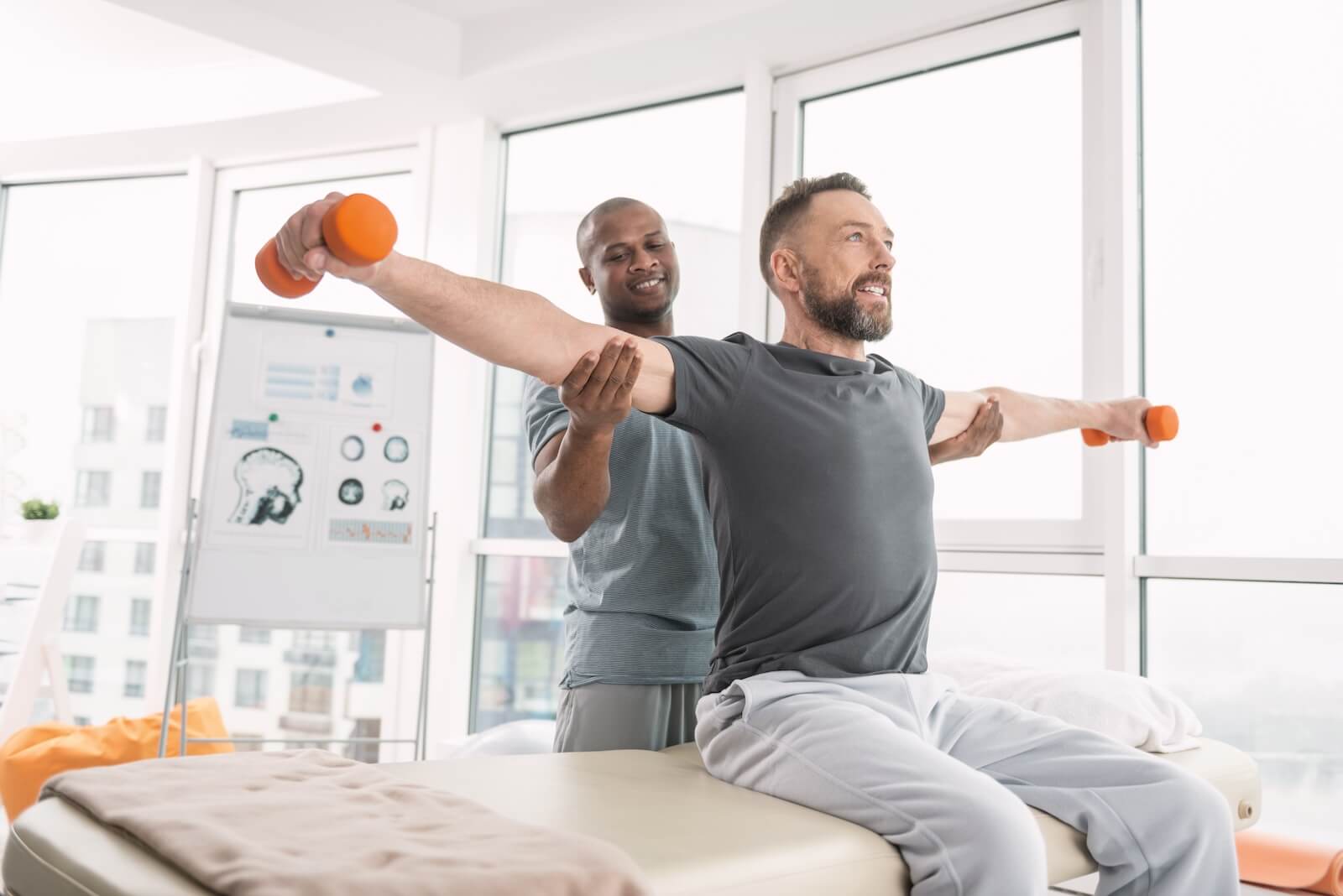A ruptured muscle, also known as a muscle strain or tear, is often caused by overexertion or overuse. It occurs when a muscle or tendon is stretched or torn beyond its capacity. These injuries are common in sports and powerlifting, and their severity can vary depending on the extent of the damage. In some cases, the recovery process can be lengthy; however, sports physical therapists can guide you through each step, providing exercises and advice to help you return to your sport.
Whether you’re a seasoned athlete or a casual gym-goer, muscle strains are a common injury that can sideline you from your favorite activities. Fortunately, there are several effective strategies to prevent and treat muscle strains, allowing you to stay active and pain-free. Here, we will discuss some methods to practice healthy muscular care and tips for adequately recovering and rehabilitating ruptured muscles.
Understanding Muscle Ruptures, Tears, and Strains
Muscle ruptures, tears, and strains can happen to anyone — regardless of age or fitness level. Common causes of muscle tears include sudden and forceful movements, overexertion, or trauma. Often seen in powerlifters attempting new personal bests for heavier sets, muscle ruptures are usually painful injuries to sustain. The severity of muscle tears can be categorized into three degrees:
Grade 1: Usually a minor strain involving slight tearing of muscle fibers, grade 1 muscle tears are the most common type athletes sustain. Often seen in the hamstrings, shoulder muscles, or calf region, grade 1 tears require the least amount of aftercare and typically heal in a few days to a few weeks.
Grade 2: As a more significant type of strain, grade 2 muscle tears typically require more recovery than grade 1 tears. Athletes may be sidelined for a few weeks in professional sports before returning to play.
Grade 3: The most severe form of muscle tear, grade 3 tears consist of a complete tear of the muscle or severe strain. In many athletes who sustain a grade 3 tear, severe bruising and immobility are typical aftereffects of severe muscle tear, and recovery can range anywhere from weeks to months.
How a Muscle Rupture Happens
A muscle rupture occurs when a muscle or tendon is stretched or torn beyond its normal capacity. This typically happens due to overexertion, improper warm-up, muscle fatigue, or direct trauma.
For instance, explosive movements like power cleans or box jumps performed without proper warm-up can strain muscles, as they aren’t prepared for sudden exertion. Similarly, direct trauma, such as a collision in soccer or football, can cause muscle tears. Many soccer players sustain calf muscle tears from the impact of cleats during sliding tackles.
Once a muscle is torn, it takes time for the body to initiate the healing process. During this period, individuals may experience pain, swelling, and limited range of motion. In severe cases, complete muscle tears may require surgical intervention to repair the damaged tissue.
Early Intervention for Proper Recovery
Early intervention in muscle rupture injuries can significantly impact the recovery process. Immediate action, such as following the R.I.C.E. method ( i.e., rest, ice, compression, and elevation), can help reduce inflammation, minimize pain, and promote healing:
Rest: Avoiding activities that further strain or aggravate ruptured or torn muscles allows muscle fibers to begin healing. Without adequate rest, muscles may heal improperly or worsen the existing injury.
Ice: Applying ice packs to injured areas for 15-20 minutes several times daily can help reduce inflammation and swelling.
Compression: Combined with ice application, wrapping injured areas with compression bandages helps to reduce swelling and improve blood circulation, facilitating healing.
Elevation: Elevating injured limbs above the heart helps to reduce the pressure from swelling and promote lymphatic drainage. This can help relieve pain and throbbing while expediting healing.
The Role of Physical Therapy in Muscle Recovery
Physical therapists play a crucial role in recovering from a muscle tear. After thoroughly evaluating your injury and medical history, physical therapists develop personalized rehabilitation plans to help you regain your strength, flexibility, and function. Through pain management strategies and therapeutic exercises, physical therapists help you to practice safe and effective rehabilitation techniques that reduce the risk of re-injury and promote healthy recovery. Some rehabilitation strategies your physical therapist may use are:
Pain management Strategies: Massage, heat, electrical therapy, and stimulation can reduce pain and inflammation in targeted areas. Pain reduction not only helps the patient feel better but also allows patients to participate in rehabilitation exercises with minimal effects.
Range of Motion Therapy: These exercises help to restore normal movement and flexibility in injured areas. Physical therapists may assign exercises that include twisting, rotating, or stretching to manipulate affected areas over time and allow them to return to their original range of motion.
Strengthening Exercises: As injuries heal, strengthening exercises rebuild muscle strength and prevent reinjury. Strengthening injured areas also prevents dependency and overcompensation of mirroring muscles, allowing balance and equilibrium in the body.
Functional Exercises: Physical therapists can simulate sports movements to help you return to your normal activities. For example, soccer players may perform controlled kicking exercises after sustaining a muscle injury in their legs.
Modalities: Other approaches to physical therapy, such as ultrasound and cryotherapy, may supplement your rehabilitation plan alongside other treatment methods.
Optimize Your Muscle Recovery With Total Physical Therapy
Muscle ruptures or tears can be painful and inconvenient, requiring patience, persistence, and comprehensive care. Following a licensed physical therapist’s expert advice can help you restore muscle function and get back to your daily activities and sports.
Serving the Denver Metro area, Total Physical Therapy is your full-service physical therapy clinic dedicated to healing joint and muscle injuries and speeding up recovery. Through personalized care and a one-on-one approach to rehabilitation, our highly trained physical therapists provide quick pain relief and take the extra step to help you prevent reinjury and future injuries. To schedule an appointment, visit our website or call (303) 758-5060.




